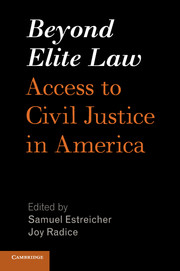Book contents
- Frontmatter
- Contents
- Beyond Elite Law
- Foreword
- List of Contributors
- Overview
- Overview
- PART I CURRENT STATE OF ACCESS TO LEGAL SERVICES
- PART II SOURCES OF LEGAL SERVICES ASSISTANCE FOR WORKING AMERICANS
- PART III FASHIONING A REFORM AGENDA
- 23 New York State Task Force to Expand Access to Civil Legal Services
- 24 New York's 50-hour Pro Bono Requirement
- 25 Starting a “Low Bono” Law Practice
- 26 Toward a More Effective and Accessible Solo and Small Firm Practice Model
- 27 Facilitating Homemade Wills
- 28 Court Facilitation of Self-Representation
- 29 Limited Representation and Ethical Challenges
- 30 Technology Can Solve Much of America's Access to Justice Problem, If We Let It
- 31 Mediation of Employment Disputes at the EEOC
- 32 AAA Consumer Arbitration
- 33 Saturns for Rickshaws: Lessons for Consumer Arbitration and Access to Justice
- 34 Employment Arbitration in the Securities Industry
- 35 FINRA Arbitration and Employment Disputes
- 36 Arbitration as an Employee-Friendly Forum
- 37 Access to Justice in Employment Arbitration: a Critical Look
- 38 Collaborative Technology Improves Access to Justice
- 39 Union Representation in Employment Arbitration
- 40 Legal Representation for New York City's Chinese Immigrant Workers
- 41 Reassessing Unauthorized Practice of Law Rules
- 42 The Pyett Protocol: Collectively-Bargained Grievance Arbitration as a Forum for Individual Statutory Employment Claims
- PART IV CREATING A CULTURE OF SERVICE
- Index
27 - Facilitating Homemade Wills
from PART III - FASHIONING A REFORM AGENDA
Published online by Cambridge University Press: 05 May 2016
- Frontmatter
- Contents
- Beyond Elite Law
- Foreword
- List of Contributors
- Overview
- Overview
- PART I CURRENT STATE OF ACCESS TO LEGAL SERVICES
- PART II SOURCES OF LEGAL SERVICES ASSISTANCE FOR WORKING AMERICANS
- PART III FASHIONING A REFORM AGENDA
- 23 New York State Task Force to Expand Access to Civil Legal Services
- 24 New York's 50-hour Pro Bono Requirement
- 25 Starting a “Low Bono” Law Practice
- 26 Toward a More Effective and Accessible Solo and Small Firm Practice Model
- 27 Facilitating Homemade Wills
- 28 Court Facilitation of Self-Representation
- 29 Limited Representation and Ethical Challenges
- 30 Technology Can Solve Much of America's Access to Justice Problem, If We Let It
- 31 Mediation of Employment Disputes at the EEOC
- 32 AAA Consumer Arbitration
- 33 Saturns for Rickshaws: Lessons for Consumer Arbitration and Access to Justice
- 34 Employment Arbitration in the Securities Industry
- 35 FINRA Arbitration and Employment Disputes
- 36 Arbitration as an Employee-Friendly Forum
- 37 Access to Justice in Employment Arbitration: a Critical Look
- 38 Collaborative Technology Improves Access to Justice
- 39 Union Representation in Employment Arbitration
- 40 Legal Representation for New York City's Chinese Immigrant Workers
- 41 Reassessing Unauthorized Practice of Law Rules
- 42 The Pyett Protocol: Collectively-Bargained Grievance Arbitration as a Forum for Individual Statutory Employment Claims
- PART IV CREATING A CULTURE OF SERVICE
- Index
Summary
Can we simplify legal processes so that individuals and their families can structure their affairs, including planning for the distribution of their estate when they die, without recourse to lawyers? In this chapter, Reid Weisbord offers an approach for facilitating the writing of wills that avoids some of the legal pitfalls than can bedevil self-help in this area. He proposes the use of a simplified will form that would be attached to a state income tax return that removes barriers to drafting a will and creates a vehicle for states to promote testacy.
Decades of empirical studies reveal that although most Americans intend to make a will, surprisingly few execute one. Most individuals die without a will, allowing the default rules of intestacy to govern the disposition of property at death. This is problematic because most Americans cannot correctly identify their intestate heirs, so the absence of a will creates the possibility that default rules may fail to carry out the decedent's probable intent. Among many possible adverse consequences, unintended intestacy can cause financial hardship, uncertainty, and frustrated expectations for the decedent's intended beneficiaries. The default rules of intestacy are also structurally unsuitable for the large and growing population of nontraditional families because heirship is limited to individuals related to the decedent by marriage, blood, or legal adoption.
This chapter explores the possibility that complexities embedded in the will-making process itself are at least partly responsible for the high rate of unintended intestacy. Unlike other acts of legal significance, such as entering into a marriage or consumer contract, the will-making process is unfamiliar to most individuals and requires legal drafting and compliance with testamentary formalities. Negative public perceptions about the will-making process discourage lay testation, and many individuals are reluctant to deal with a lawyer for reasons of cost or privacy. Those perceptions most likely arise from the law's historic hostility toward homemade wills and self-representation in the estate-planning context. For more than a century, courts have required strict compliance with statutorily imposed formalities for executing a will; failure to comply, even in cases of harmless error, led to the will's rejection from probate.
- Type
- Chapter
- Information
- Beyond Elite LawAccess to Civil Justice in America, pp. 395 - 412Publisher: Cambridge University PressPrint publication year: 2016



